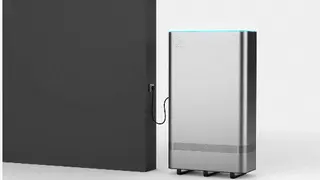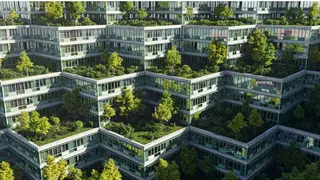The lush fields on both sides of the highway in a sense serve as precursors to what we are about to witness as we approach VE Commercial Vehicles Ltd's three-year-old bus plant in Indore’s Baggad region.
The greenery that stretches before the eye matches the purpose of our visit — to tour the clean, near waterless factory set up by the company. Touted as the first platinum-rated Green Factory Building in Madhya Pradesh and the first bus plant to have a Green Building certification in the country, we are wondering what we will see that is drastically different from other such plants.A joint venture between the Volvo Group (Volvo) and Eicher Motors Limited (EML), the plant is designed on the concept of ‘0’ emission. It is from here that the factory also derives another measure that could easily be one of the first in the industry -- zero water discharge.
Waterless processes“Our paint shop is totally waterless. In the entire plant we only use water in the air supply unit and for human intake. The discharge from this operation, in fact, is treated and 69 per cent is used for gardening in our landscaped areas and 31 per cent for flushing the toilets in the building,” says B Anil Baliga, Executive Vice President, as he walks us through the plant which has a 32 per cent green zone that nurtures a majority of drought plant species that need negligible water.
Leading us through the 1,56, 770 sq metre bus body manufacturing unit, he points out a host of measures that have been put in place to earn these distinctions. The structure shop has a welding fumes extraction system and efficient inverter-based welding machines. Moving to the assembly lines, he shows us how processes move seamlessly from one to another thanks to an automated conveyorised system. The plant is 40 per cent more productive than other OEM plants due to ensuring that the automation design is such that it results in lowering worker fatigue.
For instance, the 950 workers who roll out 30 buses a day handle large skin panels and wind shields with vacuum grippers, while electrical hoists are used to lift bigger parts and tools. For seamless production the painted shell of the vehicle when completed drops neatly on the chassis.
No hammer sounds“Our auto parts are made to such size perfection that they interlock into each other, with the sound of the hammer dropping drastically. Quality is evaluated on the spot and all material sourced locally comes on trolleys to eliminate the use of packing material,” says Baliga.
Unique to the plant is a robotic paint shop with pressured dust free booths. And with automatic shell transfer, human presence in the paint shop is eliminated. As in saving on packing, so is it in the treatment given to waste. All hazardous waste generated in the process is disposed only through government registered recyclers and re-processors who are certified to dispose responsibly.
The plant packs a punch when it comes to energy saving with an energy efficient building envelope, skylighting for enclosed areas and separate metering devices for all process and non-process loads. Its HVAC (heating, ventilation, and air conditioning) systems are CFC free, while renewable energy accounts for 28 per cent of the total energy use. In the process of being set up are solar PV panels of 24 KWp which will generate a hundred units everyday, Baliga informs us.
Pithampur on the rollIf the Baggad plant has been a feather in Eicher’s cap, it’s 30 year old bus and truck plant less than an hour away in Indore's Pithampur area has been a challenge. To turn around an old existing plant is that much more difficult, especially when it’s business as usual through the metamorphoses.
Senior Vice President Aditya K Shrivastava runs us through the enormous task. To initiate the clean up act, the Eicher Truck and Bus unit (ETB) embraced what is known as the GRIA principle. This basically stands for Go to basics; Reduce waste; Improve efficiency; and Alternate technology.
For a start, the 340,000 sq metre factory shifted its energy source to renewables. Tapping local sources, today 49 per cent of its energy comes from solar and a mini hydel power plant.
ETB has also shifted to solar-thermal hybrid air conditioners for office air conditioning, which allows for more efficiency and reduction in energy use. To create a congenial atmosphere in the shop floor, eco friendly evaporative coolers have been put in place that lower the temperature in the workspace by almost 7 to 9 degrees centigrade.
“At the paint shop we have installed a heat recovery system through which we recover heat from the exhaust, hence it conserves the LNG used for the heating application,” explains Shrivastava.
Recycling wasteTo tackle waste several measures have been introduced. For instance, the thinner that is used for painting applications in the plant is recycled and reused for degreasing and washing solvents. Waste from the workers canteens and garden trimmings are run through an organic waste converter to be turned into manure. Bit by bit, daylight harvesting has been done across the interiors of the plant, which has led to a dramatic cut in energy use and CO2 emissions. The outdoor areas have been rain water harvested, helping to enhance the water table.
“More than anything else, to bring about changes in an old factory space, you have to change the mindset of the people and only then can you put in place clean initiatives in terms of all three, safety, environment and health,” says Shrivastava summing up the effort.
(The writer visited the Eicher plants in Indore on invitation from the company)








Comments
Comments have to be in English, and in full sentences. They cannot be abusive or personal. Please abide by our community guidelines for posting your comments.
We have migrated to a new commenting platform. If you are already a registered user of TheHindu Businessline and logged in, you may continue to engage with our articles. If you do not have an account please register and login to post comments. Users can access their older comments by logging into their accounts on Vuukle.